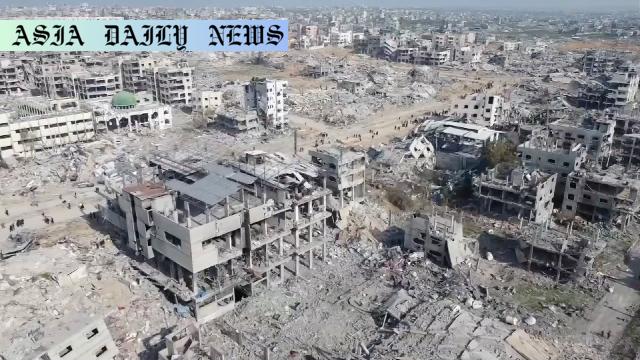Ceasefire agreement faces challenges as Israeli defense minister warns of intensified conflict unless hostages are released.
Hamas delays the sixth round of hostage releases in Gaza.
Israel’s defense minister warns of severe retaliation if hostages are not released by Saturday.
Ceasefire risks collapse despite Egyptian mediation efforts.
International community monitors sensitive peace negotiations.

A Fragile Ceasefire Faces Uncertainty
The tense ceasefire between Israel and Hamas in the Gaza Strip is under significant strain following recent developments. Amid a six-week agreement designed to bring relative stability, the situation has become precarious with both sides accusing one another of violations. As both parties express grievances, this ongoing conflict risks collapsing into a renewed and more devastating war.
The Current Conflict: Hostage Releases and Delays
At the heart of the latest tensions lies the delayed sixth round of hostage releases, scheduled by Hamas but postponed earlier this week. Hamas highlights that Israel failed to fulfill its agreement to bring adequate humanitarian aid into Gaza, exacerbating tensions. Israel, on the other hand, insists that this delay undermines the painstakingly brokered ceasefire arrangements.
Israel’s Firm Warning
On Wednesday, Israeli Defense Minister Israel Katz issued a stern warning. He declared that unless all Israeli hostages held by Hamas are released by Saturday, the conflict could escalate dramatically. Katz emphasized the intensity of any potential military response, referring to it as opening “the gates of hell”—a phrase also echoed by U.S. officials in recent statements. The remarks underscore Israel’s readiness to pursue an aggressive strategy, should diplomacy fail.
Hamas’s Perspective and Regional Mediation
Hamas, meanwhile, has placed much of the blame for recent tensions on Israel’s alleged failure to meet its responsibilities within the ceasefire arrangement. Furthermore, the group has been consulting regional allies, including Egypt, which is mediating ongoing talks between both factions. Reports suggest possible progress, as some Egyptian sources hint at a “breakthrough” in negotiations. Whether this development will result in sustained peace or simply further temporary measures remains to be seen.
The Role of Egypt as Mediator
Egypt’s role as a critical mediator cannot be understated. For years, Egypt has played a pivotal intermediary position between Israel and Hamas, often seeking solutions or at least managing periods of conflict. Experts observe that Egypt’s involvement reflects both its vested regional interests and its unique positioning as a neutral actor capable of brokering substantive dialogue. However, the scope of compromise both sides are willing to achieve will influence the overall success of these efforts.
Humanitarian Concerns in Gaza
The humanitarian crisis in Gaza remains dire despite the ceasefire’s initial aims to improve conditions. With limited access to supplies, electricity, and medical aid, the people of Gaza face immense challenges daily. The delayed flow of humanitarian assistance has prompted widespread international criticism, with many observers calling for urgent cooperation between the warring sides to ensure essential goods and services reach those in need.
International Implications of an Intensified Conflict
The implications of a renewed Gaza war would reverberate beyond the immediate region. Already a hotspot for international focus, any conflict in Gaza could prompt a cascade of political and humanitarian crises globally. From geopolitical calculations to displaced populations, the stakes continue to rise as political negotiations hang in the balance. Major governments, including those in the United States and Europe, are likely to ramp up pressure on both sides in hopes of preventing a devastating escalation.
What Lies Ahead?
Whether this simmering crisis evolves into renewed warfare hinges on the delicate negotiations now underway. While Egyptian mediators remain cautiously optimistic, the parties involved have exhibited no significant willingness to relent on critical disputes. With Saturday’s deadline openly discussed within international spheres, all eyes remain on both Israel and Hamas to see if de-escalation is achievable.



Commentary
The Fragility of Ceasefire Agreements
The latest developments in Gaza reflect the fragile nature of ceasefire agreements in conflict-zones like this. It is abundantly clear that trust and commitments from all sides involved are indispensable for sustained peace. Unfortunately, these agreements often rest on contentious terms that are easily unraveled by minor, albeit impactful, violations. The delay in hostage releases and disagreements over aid funding demonstrate how quickly distrust can resurface, fueling additional instability.
International Responsibility and Regional Efforts
Egypt’s role in facilitating negotiations highlights the necessity of regional leadership in de-escalating conflicts. However, international entities, including Western governments and humanitarian organizations, have a significant role to play. It is imperative these stakeholders work to provide impartial support for constructive dialogue. Moreover, ensuring that humanitarian aid reaches Gaza firsthand without bureaucratic hurdles or delays should be prioritized above all else.
The Humanitarian Lens Amidst Political Deadlock
Often lost in these geopolitical debates are the individuals directly impacted by these hostilities. Palestinians living within Gaza endure harsh conditions, compounded by lacking access to essential resources. Similarly, the families of hostages in Israel experience intense insecurity and emotional tolls. These human consequences remind us that diplomacy is not simply about political wins but addressing the lived realities of those affected by this decades-long struggle.